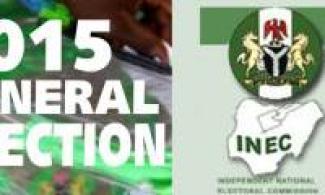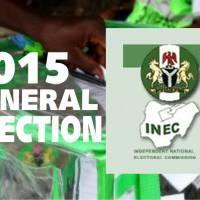
Democracy, as globally understood, is a system where rights of every citizen are not only fundamental to the sustenance of the system but legal, having been made constitutional.

These rights include right to life, right to education, right to work, right to shelter, right of association, right to vote and be voted for, freedom of movement, right of citizenship; among others. There won't be a democracy if individual rights are not constitutionally guaranteed, promoted and protected.
Somehow, Nigeria seem to be losing quite fast on transforming its hard earned civil rule to democratic governance, if global concept of democracy aligns with the above.
Understandably, democracy in many countries have never been people driven in essence, but nowhere else is democracy, pseudo or not, practiced with so much disdain for the constitution, decency and rule of law like Nigeria, especially since 1999 and even more since the advent of the Goodluck Jonathan administration; a government that has risen above all its predecessors put together, in impunity.
Here, even the protection of lives and properties and law enforcement which are constitutional duties of the police are not guaranteed if you are not a member, sympathizer or enthusiast of the ruling party.
Political meetings or rallies of opposition parties are either disrupted or participants are denied access to the venues. Governors Adams Oshiomhole, Rotimi Amaechi, and Magatarda Wamako of Edo, Rivers and Sokoto states, respectively, were prevented from entering Ado Ekiti to join their colleagues for the re-election rally for then Governor Kayode Fayemi of Ekiti State, South West Nigeria while the entire Osun State was fully occupied by armed soldiers and hooded security agents during the last governorship election in that state.
Recently before the close of 2014, the head of the Nigerian Police, Suleiman Abba wasted no time in ordering the withdrawal of security aides to the sitting Speaker of the House of Representatives simply because he decided to abandon the ruling party, Peoples Democratic Party, in furtherance of his right of association under Section 40 of the Constitution of the Federal Republic of Nigeria.
The police didn't stop at that, they condoned off all entrances to the National Assembly and expended tear gas on the Speaker and members of the House of Representatives who dared the police, jumped fence and occupied the house they have been elected to sit until the next election.
Just before then, a senior police officer ordered his men to bundle a journalist, Amaechi Anakwe of the African Independent Television, A.I.T, into detention soon after innocuously but correctly describing him, Joseph Mbu as a "controversial" police officer during his presentation on a live programme on A.I.T. Mbu, had previously served as head of the Rivers State Command of the Nigerian Police where he acted in manners that publicly compromised the constitutional status of the police as an unbiased, non partisan organisation with responsibility to protect lives and properties without class, creed, political or ethnic considerations, with reckless abandon.
Before Mr. Mbu got moved to the Federal Capital Territory Command, he earned himself official accolades for desecrating the constitutional responsibilities of a national police when he chose to expose the clear lack of discipline, knowledge and decency in Africa's largest security organisation with his obvious partisanship in the management of a well organised protest by the BringBackOurGirls group, a group that has consistently demanded the rescue of 219 teenagers snatched from their school dormitories almost 300 days ago with no serious concern by the Nigerian authorities apart from incongruous media statements by the military and other security agencies who will announce locating the innocent girls in the morning and by afternoon divert public discourse on same with a claim of gunning down several hundreds of members of a gang of urchins that an army so well budgeted for is yet to overrun. Sadly, before dawn, village hunters come up with undisputed claims of being responsible for the defeats suffered by the bloodthirsty, directionless elements who talks religion but completely anti God in every sense.
Several times, the military announced through their spokespersons that they have either located the Chibok Girls or that they re-captured towns taken by terror gangs and soon after, what we read and hear in the media indicate fear and indolence on the part of those who should have been empowered to protect the territorial integrity of our country. Defence and security have had the highest budgetary allocations as always, and much more since the advent of insurgency in the country. The prevailing terror barrages have exposed the actual destination of these allocations: private pockets.
Tolerating elements in security agencies who assume their duties are more for political parties and individuals in power or corridors of power by a government "elected" by the people and for the people clearly show disdain for civil rule, and destructive instincts for democracy.
One of the greatest threats to democracy in Nigeria is the politician, the politician in public office from the highest office to the lowest who display contempt for constitutional challenges; who rewards corruption with otherwise respected National Awards; who attend social functions to welcome those convicted of crimes against the people by stealing public money; who diminishes national security challenges.
Indeed, those who reduce our collective agony to ethnic or religious advantages or disadvantages shouldn't be counted as helping us to get out of the contraption of perpetual underdevelopment, despite overwhelming presence of wealth in natural resources; most of which get continually ignored.
It’s a shame that Ibrahim Babangida will tell his interviewers from a journal of an otherwise dreaded anti corruption agency, the Economic and Financial Crimes Commission, EFCC, that his administration, a government of crooks, should be congratulated for being less corrupt. Babangida institutionalised corruption. And that institution produced the present leaders who don't believe stealing and corruption run through the same veins of impunity.
It may be so easy to lampoon people who succeed others in power, but not too easy for history to erase those who irresponsibly or perhaps, stupidly handed over Africa to second slavery. Babangida did. His military dictatorship was the lab test for Africa's second slavery. His administration brought neo liberal economic and political policies to Africa's most populated country and today, evidently, these policies have left our people in deeper poverty, destroyed public institutions, which were eventually sold out to cronies of the administration in manners that circumvented rules and decency. The Babangida administration deepened our national crisis through the entrenchment of corruption, destruction of quality education, proliferation of indiscipline in public service, mass poverty etc. Leaders that came after him, rather than confront these and redirect our collective fortunes to common good further entrenched our collective agony. Today, corruption has become a full citizen of Nigeria. Indeed, corruption governs Nigeria.
Nigerians need to decide whether or not these should continue. And the next series of elections, especially the National Assembly and Presidential elections provides us the opportunity to decisively throw out those who have sucked our blood in perpetuity.
Denja Yaqub is an Assistant Secretary at the headquarters of the Nigeria Labour Congress, Abuja